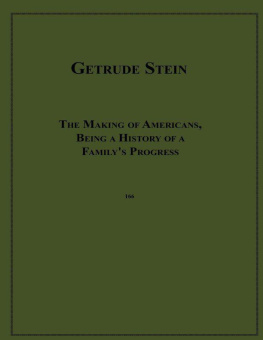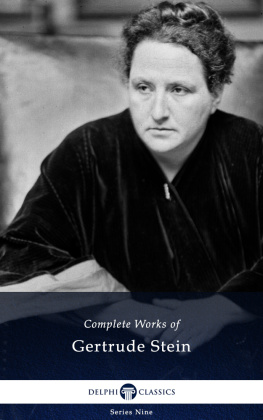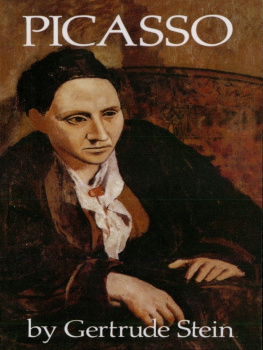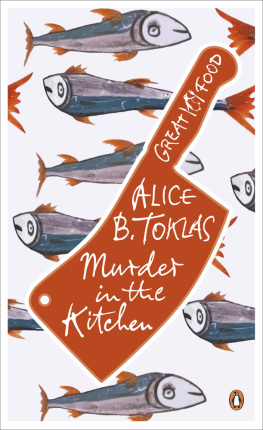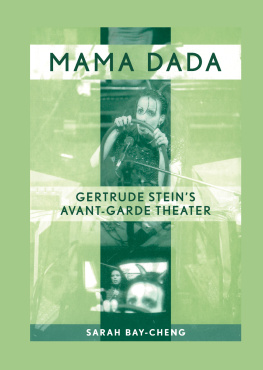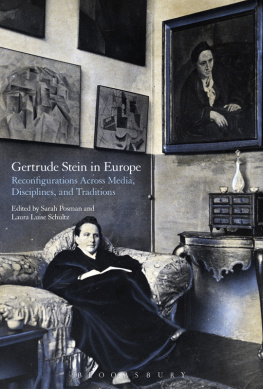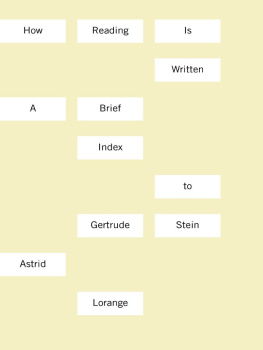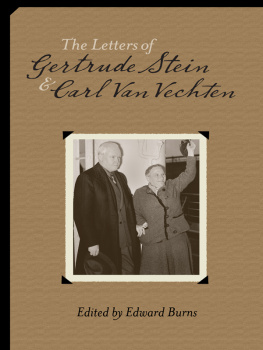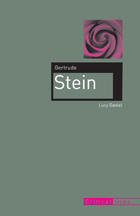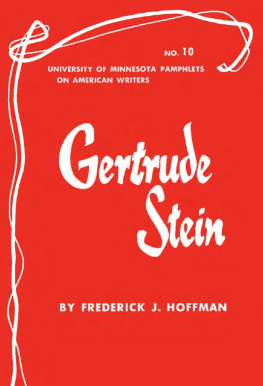Gertrude Stein - The Making of Americans, Being a History of a Familys Progress
Here you can read online Gertrude Stein - The Making of Americans, Being a History of a Familys Progress full text of the book (entire story) in english for free. Download pdf and epub, get meaning, cover and reviews about this ebook. year: 2012, publisher: Olympia Press, genre: Home and family. Description of the work, (preface) as well as reviews are available. Best literature library LitArk.com created for fans of good reading and offers a wide selection of genres:
Romance novel
Science fiction
Adventure
Detective
Science
History
Home and family
Prose
Art
Politics
Computer
Non-fiction
Religion
Business
Children
Humor
Choose a favorite category and find really read worthwhile books. Enjoy immersion in the world of imagination, feel the emotions of the characters or learn something new for yourself, make an fascinating discovery.
- Book:The Making of Americans, Being a History of a Familys Progress
- Author:
- Publisher:Olympia Press
- Genre:
- Year:2012
- Rating:3 / 5
- Favourites:Add to favourites
- Your mark:
- 60
- 1
- 2
- 3
- 4
- 5
The Making of Americans, Being a History of a Familys Progress: summary, description and annotation
We offer to read an annotation, description, summary or preface (depends on what the author of the book "The Making of Americans, Being a History of a Familys Progress" wrote himself). If you haven't found the necessary information about the book — write in the comments, we will try to find it.
The Making of Americans, Being a History of a Familys Progress — read online for free the complete book (whole text) full work
Below is the text of the book, divided by pages. System saving the place of the last page read, allows you to conveniently read the book "The Making of Americans, Being a History of a Familys Progress" online for free, without having to search again every time where you left off. Put a bookmark, and you can go to the page where you finished reading at any time.
Font size:
Interval:
Bookmark:
The Making Of Americans, Being A History Of A Family's Progress
Gertrude Stein
This page copyright 2009 Olympia Press.
http://www.olympiapress.com

The Making Of Americans
Once an angry man dragged his father along the ground through his own orchard. Stop! cried the groaning old man at last, Stop! I did not drag my father beyond this tree.
It is hard living down the tempers we are born with. We all begin well, for in our youth there is nothing we are more intolerant of than our own sins writ large in others and we fight them fiercely in ourselves; but we grow old and we see that these our sins are of all sins the really harmless ones to own, nay that they give a charm to any character, and so our struggle with them dies away.
It has always seemed to me a rare privilege, this, of being an American, a real American, one whose tradition it has taken scarcely sixty years to create. We need only realise our parents, remember our grandparents and know ourselves and our history is complete.
The old people in a new world, the new people made out of the old, that is the story that I mean to tell, for that is what really is and what I really know.
Some of the fathers we must realise so that we can tell our story really, were little boys then, and they came across the water with their parents, the grandparents we need only just remember. Some of these our fathers and our mothers, were not even made then, and the women, the young mothers, our grandmothers we perhaps just have seen once, carried these our fathers and our mothers into the new world inside them, those women of the old world strong to bear them. Some looked very weak and little women, but even these so weak and little, were strong always, to bear many children.
These certain men and women, our grandfathers and grandmothers, with their children born and unborn with them, some whose children were gone ahead to prepare a home to give them; all countries were full of women who brought with them many children; but only certain men and women and the children they had in them, to make many generations for them, will fill up this history for us of a family and its progress.
Many kinds of all these women were strong to bear many children.
One was very strong to bear them and then always she was very strong to lead them.
One was strong to bear them and then always she was strong to suffer with them.
One, a little gentle weary woman was strong to bear many children, and then always after she would sadly suffer for them, weeping for the sadness of all sinning, wearying for the rest she knew her death would bring them.
And then there was one sweet good woman, strong just to bear many children, and then she died away and left them, for that was all she knew then to do for them.
And these four women and the husbands they had with them and the children born and unborn in them will make up the history for us of a family and its progress.
Other kinds of men and women and the children they had with them, came at different times to know them; some, poor things, who never found how they could make a living, some who dreamed while others fought a way to help them, some whose children went to pieces with them, some who thought and thought and then their children rose to greatness through them, and some of all these kinds of men and women and the children they had in them will help to make the history for us of this family and its progress.
These first four women, the grandmothers we need only just remember, mostly never saw each other. It was their children and grandchildren who, later, wandering over the new land, where they were seeking first, just to make a living, and then later, either to grow rich or to gain wisdom, met with one another and were married, and so together they made a family whose progress we are now soon to be watching.
We, living now, are always to ourselves young men and women. When we, living always in such feeling, think back to them who make for us a beginning, it is always as grown and old men and women or as little children that we feel them, these whose lives we have just been thinking. We sometimes talk it long, but really, it is only very little time we feel ourselves ever to have being as old men and women or as children. Such parts of our living are little ever really there to us as present in our feeling. Yes; we, who are always all our lives, to ourselves grown young men and women, when we think back to them who make for us a beginning, it is always as grown old men and women or as little children that we feel them, such as them whose lives we have just been thinking.
Yes it is easy to think ourselves and our friends, all our lives as young grown men and women, indeed it is hard for us to feel even when we talk it long, that we are old like old men and women or little as a baby or as children. Such parts of our living are never really there to us as present, to our feeling.
Yes we are very little children when we first begin to be to ourselves grown men and women. We say then, yes we are children, but we know then, way inside us, we are not to ourselves real as children, we are grown to ourselves, as young grown men and women. Nay we never know ourselves as other than young and grown men and women. When we know we are no longer to ourselves as children. Very little things we are then and very full of such feeling. No, to be feeling ourselves to be as children is like the state between when we are asleep and when we are just waking, it is never really there to us as present to our feeling.
And so it is to be really old to ourselves in our feeling; we are weary and are old, and we know it in our working and our thinking, and we talk it long, and we can see it just by looking, and yet we are a very little time really old to ourselves in our feeling, old as old men and old women once were and still are to our feeling. No, no one can be old like that to himself in his feeling. No it must be always as grown and young men and women that we know ourselves and our friends in our feeling. We know it is not so, by our saying, but it must be so always to our feeling. To be old to ourselves in our feeling is a losing of ourselves like just dropping off into sleeping. To be awake, we must have it that we are to ourselves young and grown men and women.
To be ourself like an old man or an old woman to our feeling must be a horrid losing-self sense to be having. It must be a horrid feeling, like the hard leaving of our sense when we are forced into sleeping or the coming to it when we are just waking. It must be a horrid feeling to have such a strong sense of losing, such a feeling as being to ourselves like children or like grown old men and women. Perhaps to some it is a gentle sense of losing some who like themselves to be without a self sense feeling, but certainly it must be always a sense of self losing in each one who finds himself really having a very young or very old self feeling.
Our mothers, fathers, grandmothers and grandfathers, in the histories, and the stories, all the others, they all are always little babies grown old men and women or as children for us. No, old generations and past ages never have grown young men and women in them. So long ago they were, why they must be old grown men and women or as babies or as children. No, them we never can feel as young grown men and women. Such only are ourselves and our friends with whom we have been living.
And so since there is no other way to do with our kind of thinking we will make our elders to be for us the grown old men and women in our stories, or the babies or the children. We will be always, in ourselves, the young grown men and women.
Font size:
Interval:
Bookmark:
Similar books «The Making of Americans, Being a History of a Familys Progress»
Look at similar books to The Making of Americans, Being a History of a Familys Progress. We have selected literature similar in name and meaning in the hope of providing readers with more options to find new, interesting, not yet read works.
Discussion, reviews of the book The Making of Americans, Being a History of a Familys Progress and just readers' own opinions. Leave your comments, write what you think about the work, its meaning or the main characters. Specify what exactly you liked and what you didn't like, and why you think so.

